By ALICE SAISHA, CAMFED Association Zambia
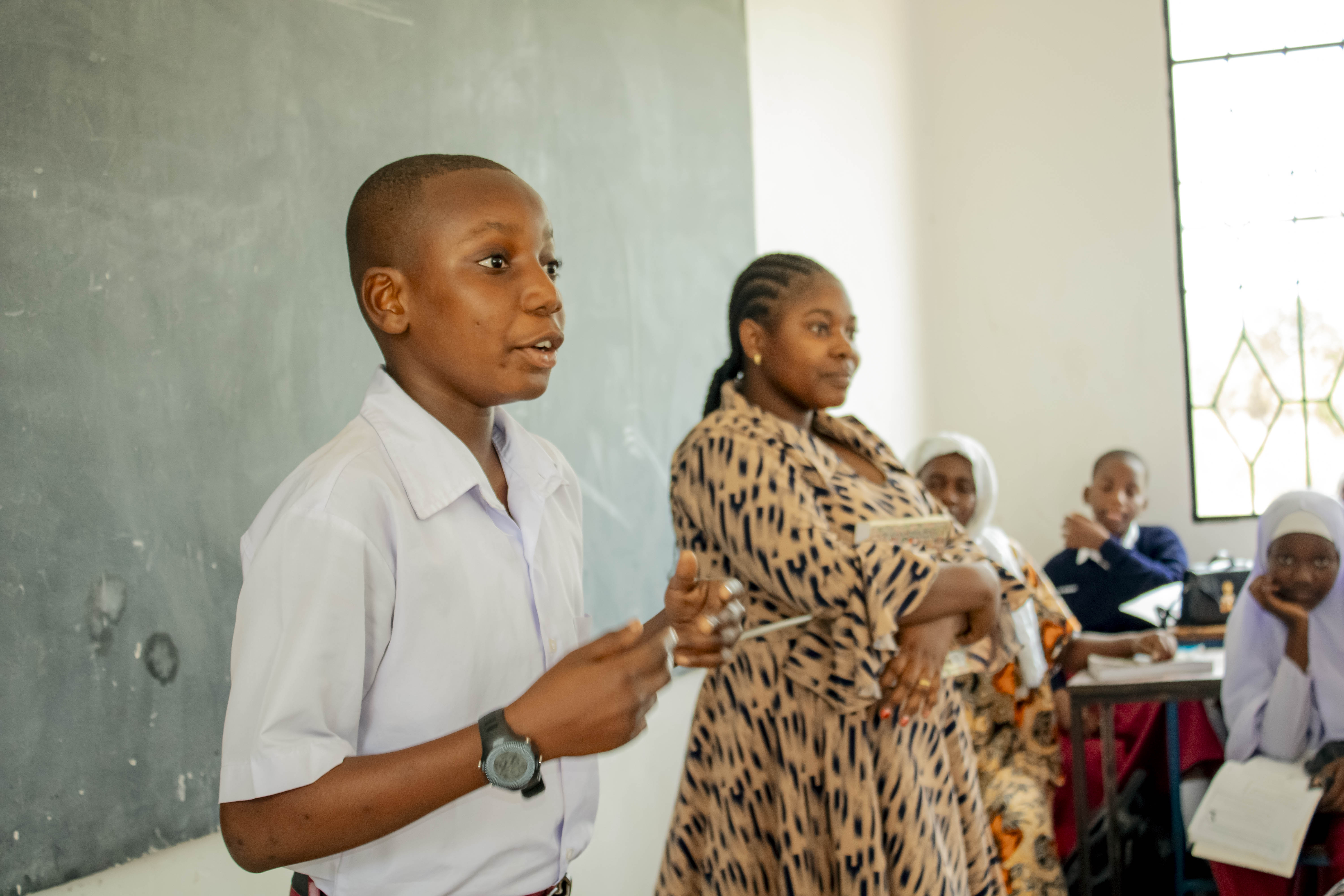
Why ‘big sisters’ matter
I'm Debora, a Learner Guide and school Matron in Tanzania. Once a vulnerable girl myself, I mentor students in Tanzania, helping them stay safe, stay…
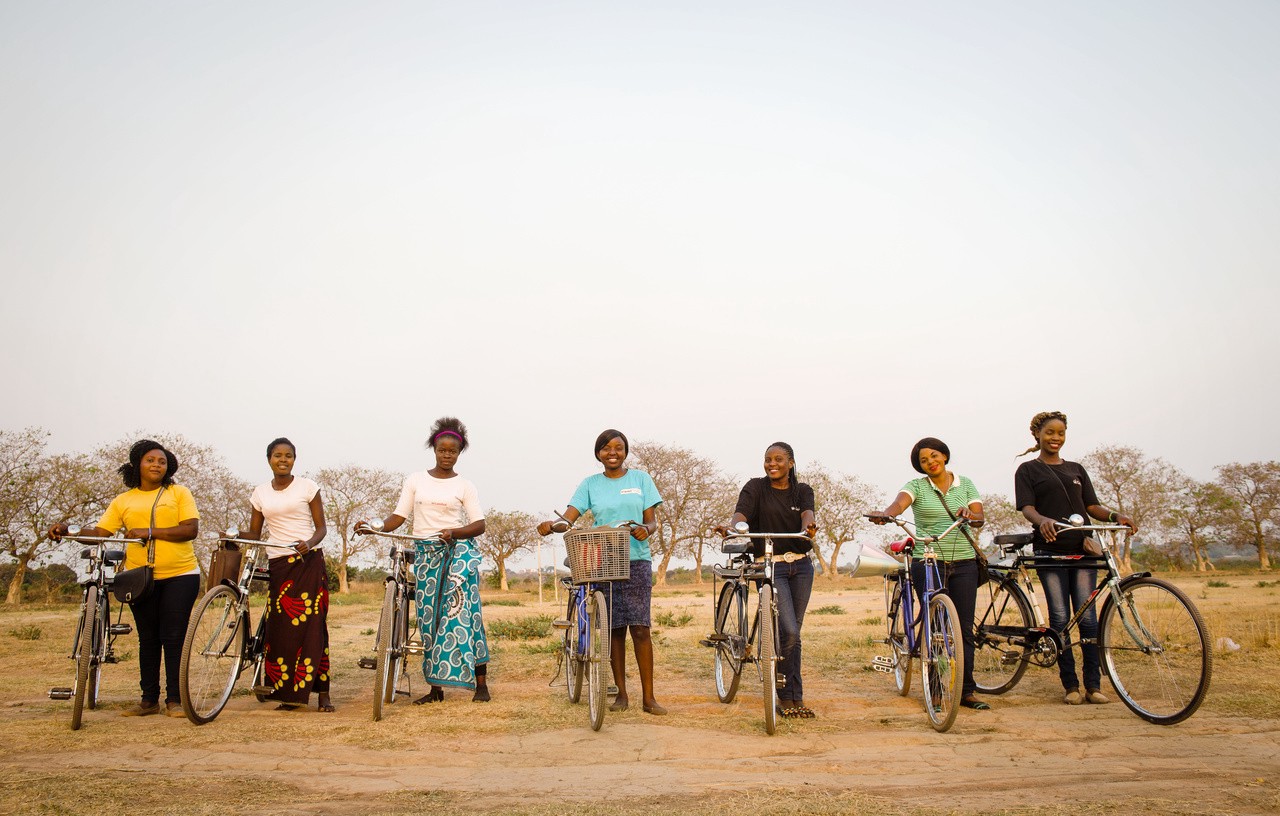
By ALICE SAISHA, CAMFED Association Zambia
Zambia, Global
I obtained that assurance through my access to education, which paved the way for my better living standards. I was able to go to school because of the bursary package provided by the Campaign for Female Education (CAMFED) and the endless support and mentoring from community members, at a time when I was extremely vulnerable. Today my son has an open door to opportunities that did not seem possible for me at his age. The next generation has been equipped with education, protection, and will be respected in the community.
Our CAMFED Association is renowned for its ability to unite thousands of young rural women from similar backgrounds across Africa to address common problems. It is a movement that was formed by school graduates who were supported by CAMFED who were determined to stay connected and make impactful change in their communities. From inception as a peer support network for young women, the word ‘sisterhood’ spelt out the strength in how working together would trigger a unified voice of change.
In this time where the globe has been hit by COVID-19, it makes me worry that these changes might be reversed, and hence the need for unity more than ever for every young leader who knows what it means to be vulnerable.

Thanks to our sisterhood I gained the confidence to become a leader, and support more vulnerable girls to succeed. (Photo taken before the pandemic began) Photo: CAMFED/Eliza Powell
It is thanks to our sisterhood that I found my confidence and became a leader in my community. I worked with stakeholders, including groups of parents and CAMFED district committees to help keep girls in school. I left my mark by sharing knowledge and skills on how to promote child protection, as I am so passionate about it, and knowledge is more valuable as it is passed on to others.
I took up the responsibility of supporting 10 children to go to school using my own income

Me with some of the girls I have been supporting through school with my own resources. (Photo taken before the pandemic began) Photo: CAMFED/Eliza Powell
By sharing my story, and my lived experience, I helped inspire girls in school. I understand girls’ hardships — such as lack of school supplies, lack of sanitary wear, and insufficient school funds — intimately, and so I took up the responsibility of supporting 10 children to go to school using my own income.
I looked up to my other sisters, such as Gift Namuchimba, who was the first elected National Chairperson of the CAMFED Association in Zambia, and knew that I too could take up a leadership role. After receiving training, I worked with my fellow Association sisters, Kawengo, Ruth, and Elizabeth, to help train other young women in entrepreneurship. My sisters always assisted me in all preparations and took time to provide peer support.
Since the year 1998, the CAMFED Association has grown like a forest across 5 nations (Ghana, Malawi, Tanzania, Zambia and Zimbabwe), making it unstoppable and stronger by the tide. It holds a powerful representation of vibrant young women who are now working in medicine, law, as agriculturalists, and as business owners, to mention a few. With our number currently standing at 157,005 members, we’ve already achieved so much, but we are just getting started!
Every day we see how a small vulnerable girl who once had lost all hope in their future grows into a powerful, confident and enthusiastic woman

My CAMFED Association sister Nimatu in Ghana, working with the traditional leaders in her community. (Photo taken before the pandemic began) Photo: CAMFED/Eliza Powell
Over the years, as CAMFED Association members, we have not only helped grow ourselves, but have helped promote positive change in our societies by using existing connections. We partner with traditional leaders and local parent groups, a relationship that connects us to our roots in the communities where we were born and raised. Every day we see how a small vulnerable girl who once had lost all hope in their future grows into a powerful, confident and enthusiastic woman who is determined to not leave any girl behind.

As young women once excluded from education, understanding the dynamics of abuse, we make vulnerable girls and young women visible to authorities. Photo: CAMFED/Eliza Powell
Some of the common problems girls and young women face in our community are: poverty, child marriages, domestic violence and many more structural challenges. When families lack knowledge and financial resources, girls in our community are excluded from education, often ‘invisible’ to authorities. These are cases we follow up during home visits to help return them to school.
Africa is the world’s last frontier in the fight against extreme poverty. 413 million people (44.7% of the population) in sub-Saharan Africa live below the international monetary poverty line of $1.90 per day. They make up 56% of the world’s poor.[1] Poverty leads to hunger and hopelessness. Hunger and hopelessness lead to violence and abuse. One of my CAMFED Association sisters recently said, “A hungry man is an angry man.”
Most of us have direct experience of abuse, or seen its consequences in our communities. That’s why every day we work to make sure girls’ rights are respected.
Child abuse is a human rights violation, and an all too common harmful act. The cycle of poverty and child neglect delays a child’s cognitive development, and robs a child of their right to dream. As members of the CAMFED Association (CAMA) we will not tolerate abuse. Most of us have direct experience of abuse, or seen its consequences in our communities. That’s why every day we work to make sure girls’ rights are respected. This calls for unity, strength, and pooling our expertise and resources: Each of us, on average, support 3 girls through education, and now we are raising the bar to support at least 5 girls.
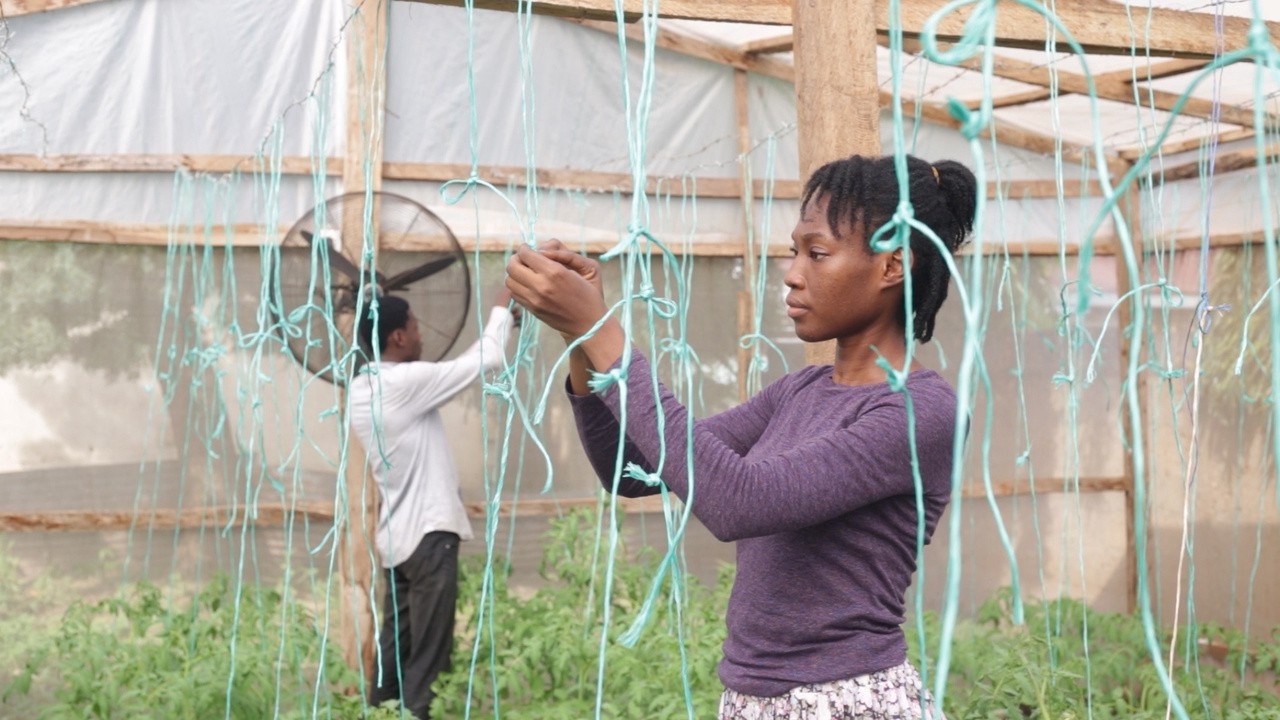
My CAMFED Association sister Cindy grows nutritious vegetables for her community using affordable greenhouse technology to extend the growing season, and help fight hunger. Photo: CAMFED/Jonathan Kotei
We can do this because we’ve come together as a movement: My sisters who are experts in agriculture — like Winnie here in Zambia, Vivian in Zimbabwe, Malumbo in Malawi, Eva in Tanzania and Cindy in Ghana — will promote a wide range of climate smart projects. Those with law degrees, like Fiona from Zimbabwe, will guide on how best we can come up with policies that will speak for the welfare of young girls.
Healthcare professionals like Fatima in Ghana, Ottilia in Zimbabwe, and Ronah in Zambia will speak to the measures that can be put in place to promote health in an individual and provide medical aid. And entrepreneurs like Ruka in Ghana, Luwiza in Malawi, Lindiwe in Zimbabwe, Sandra here in Zambia, and Stumai in Tanzania are creating employment, providing support and mentoring the next generation.

My CAMFED Association sister Fatima in Malawi, supporting students in her community. (Photo taken before the pandemic began) Photo: CAMFED/Eliza Powell
And of course not to forget the many CAMFED Association members who are now teachers in their communities, changing the status quo from within — Charity here in Zambia, Aida in Tanzania, Lucia in Zimbabwe, Saviour in Ghana and Fatima in Malawi.
Together, we are helping to raise more resources to support more children, and working with our communities to make the most vulnerable visible to authorities, and amplify their voices.

My CAMFED Association sister Ottilia in Zimbabwe, volunteering as a nurse aid and supporting her community to set up low cost handwashing stations.
CAMFED Association members trained as Learner Guides are now using local radio stations to reach children with life skills and wellbeing lessons. They also help vulnerable children, using every means available to reach those who do not have access to TV or online learning during the COVID-19 pandemic.
This includes locally distanced in-person study groups; working with Chiefs to bring up to date information about the virus to communities; working with teachers to distribute study materials; making posters and flyers to remind learners about the health guidelines, and providing them with reusable masks.
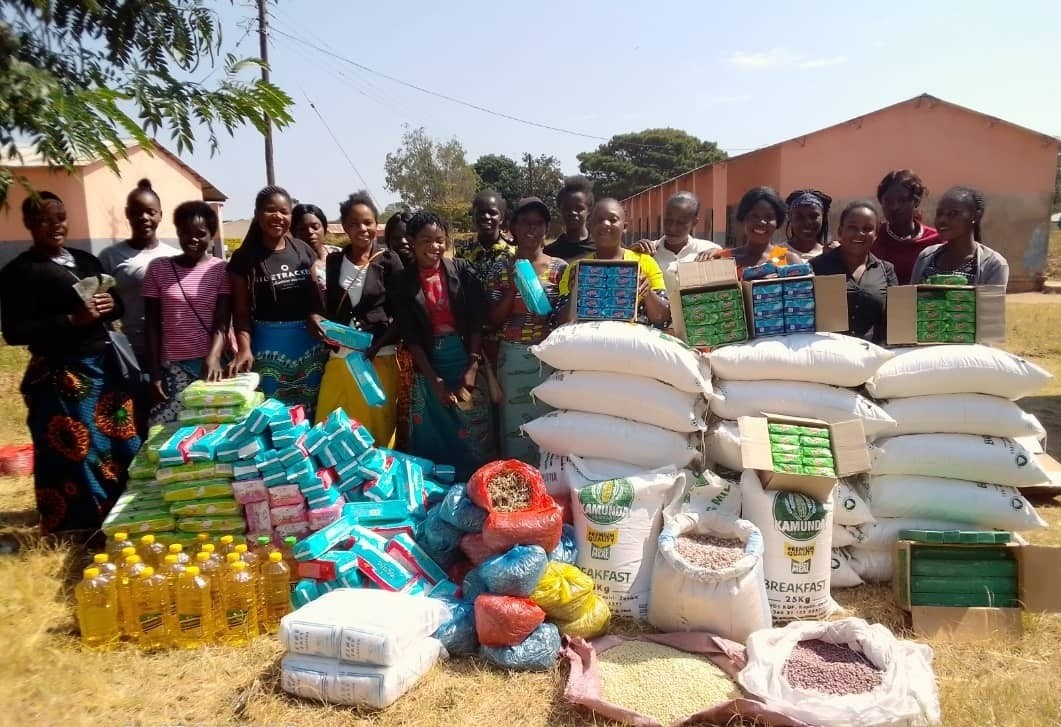
Members of our sisterhood donating food and sanitary pads to vulnerable girls and their families in my home district of Samfya.
We have been partnering with local schools, social services, victim support units, parent groups and the police to ensure children can stay safe and keep learning.
That might mean distributing food parcels, or reporting abuse.
We are now multiplying opportunity for the benefit of entire nations
We who were mentored, trained, supported, counselled and granted the opportunity to have an education through CAMFED are now multiplying that opportunity for the benefit of entire nations.
I am proud to set this example for my son, so he can grow up in a world where no child will be left behind, and understand the power of unity and collective action.
We are one body with many parts, we need each other to function and fulfill our purpose. We believe in advocacy, multiplication of knowledge, creation of leadership and taking ACTION.
We are the CAMFED Association, leaders of change!
[1] UN SDG Indicators (2019) https://unstats.un.org/sdgs/report/2019/goal-01/ and UNDP Poverty Index (2019), http://hdr.undp.org/sites/default/files/mpi_2019_publication.pdf, p. 19, Table 1. Accessed 8 February 2021.

I'm Debora, a Learner Guide and school Matron in Tanzania. Once a vulnerable girl myself, I mentor students in Tanzania, helping them stay safe, stay…
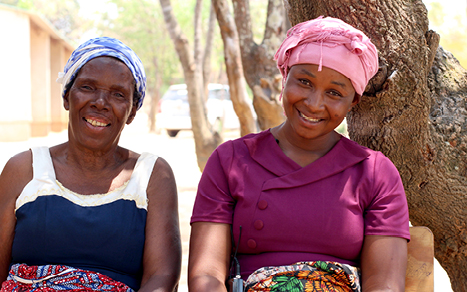
I decided to join the Mother Support Group because I wanted to counsel girls and help them progress in education. It feels really good that…
Jeremy Blain £57.4
Geoffrey Acaye £47
Sara Mikael $106
Denae Whaley $20
David C Murray $3783
Trenay Hoye $10.9
Caroline Fenton £100
Victor Mesny $500
Niko Gomes $316
Katja Guenther $263
Ryan Gallagher $526
Catherine Packer $316
Caitlin Guthinger $526
Julia Colingsworth $14
Phuc Tran $350